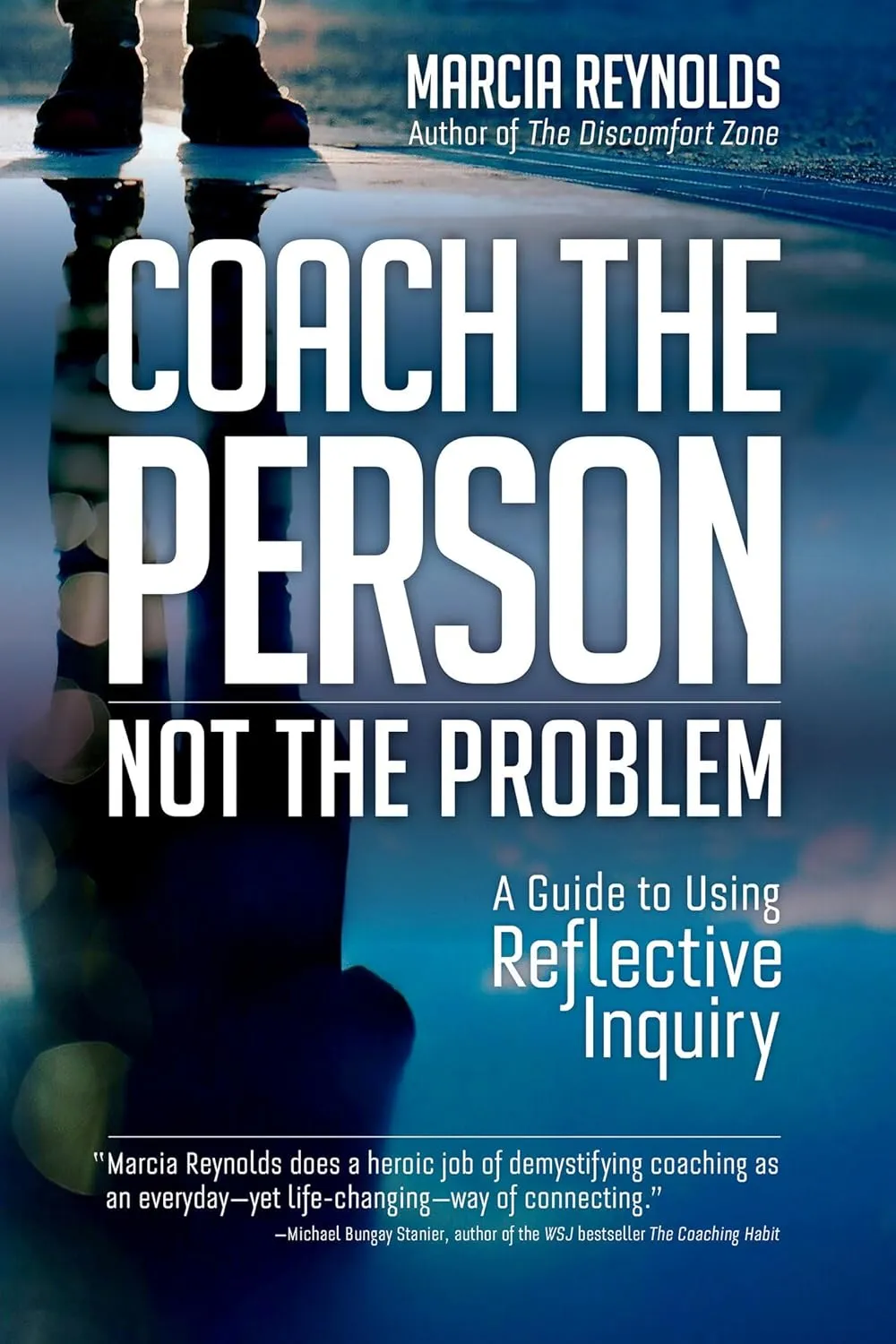About this book
Five Key Takeaways
- Reflective inquiry disrupts automatic thinking for deeper insights.
- Flexibility is vital for effective and personalized coaching.
- Focus on the person, not the problem for growth.
- Use reflective statements to enhance client self-awareness.
- Cultivating presence fosters deeper connections and trust.
-
Reflective Inquiry Disrupts Fixed Thinking
People rarely challenge their own thinking or beliefs without external prompting, which can limit their personal growth and decision-making (Chapter 1).
This tendency stems from a reliance on inherited stereotypes and deeply ingrained biases that go unexamined in daily life.
Reflective inquiry disrupts these automatic thought patterns, encouraging individuals to reconsider their assumptions and uncover hidden biases.
As people articulate their thoughts in this safe and structured process, they often experience insights previously inaccessible to them.
The coaching process becomes transformative, as reflective inquiry dismantles defensive mental barriers that inhibit creativity and personal discovery.
Clients become more open to viewing themselves and their decisions through a clearer and more empowering lens.
In the long term, this fosters healthier mindsets and better problem-solving approaches, positively affecting both personal and professional lives.
Ultimately, reflective inquiry is a catalyst for meaningful, identity-level change that inspires long-lasting personal development.
-
Coaching Should Adapt, Not Follow Rules
Coaching "formulas" or rigid methodologies often limit a coach's ability to connect authentically with clients.
Sticking strictly to models can create a mechanical process that overlooks individual client needs and nuances in conversations.
Clients are unique, and rigid coaching approaches may stifle meaningful dialogue, impeding growth and exploration.
The author emphasizes flexibility, arguing that adaptive coaching fosters deeper conversations and helps unlock client insights through trust.
Coaches don’t need to be seasoned experts before contributing; even newer coaches can bring value by adopting a flexible mindset.
This fluidity allows clients to engage and be more open, as they feel free from judgment or a prescribed process.
Therefore, success in coaching lies not in mastery of formulas but in building authentic, context-sensitive connections with clients.
This adaptability ultimately leads to transformative breakthroughs, making the coaching relationship truly impactful for growth.
-
Focus on the Person, Not the Issue
Clients often begin by detailing their problems, but focusing on the person leads to deeper transformations.
To do this, guide them to explore the patterns, beliefs, and fears beneath their surface-level challenges.
Ask reflective questions that push them to confront inner assumptions and motivations for lasting breakthroughs.
Focusing on internal shifts rather than problem-solving strengthens awareness and enables long-term change.
Benefits include helping clients reframe issues through empowering perspectives, sustaining confidence, and fostering self-reliance.
Neglecting this personal focus risks temporary fixes rather than meaningful identity-level improvement.
By addressing people’s inner stories and beliefs, coaches can bring about deeper, lasting transformations tailored to clients' growth journeys.
-
Articulate Insights for Clarity and Action
Clients often struggle to move forward unless they transform vague thoughts into clear, actionable insights.
Encourage them to verbalize what they’ve realized to anchor new perspectives and deepen understanding.
Ask them reflective questions to uncover how they’ve changed through the session, reinforcing their progress.
Expressing insights openly solidifies commitment to new actions, ensuring they leave with clear next steps.
Benefits include greater accountability, stronger motivation, and sustained focus on implementing solutions to issues.
Failing to clarify these insights risks clients losing momentum or falling back into old patterns of thinking.
Verbalizing breakthroughs transforms abstract realizations into practical paths forward, optimizing coaching outcomes.
-
Stories Shape Thoughts and Behaviors
People organize their lives around stories shaped by beliefs, experiences, and memories (Chapter 4).
These stories frame how individuals interpret challenges and influence the actions they take to respond.
Unexamined narratives can limit possibilities, causing clients to feel stuck or unable to move forward confidently.
Coaching helps uncover and challenge these patterns, empowering clients to rethink self-limiting thoughts and behaviors.
As clients analyze their stories, they gain clarity on how fears and assumptions control their decisions.
Breaking free from these constraints allows clients to embrace new options and reshape their outlook on life.
This process encourages identity-level growth while aligning actions with long-term goals and core motivations.
-
Define Clear Coaching Outcomes
Unfocused coaching sessions can leave clients overwhelmed or unclear about how to proceed.
Start every coaching conversation by clarifying the client’s desired outcome and aligning goals along the way.
Ask probing questions to help distill their deeper aspirations and actionable next steps to work toward.
Defined outcomes provide structure and prevent sessions from losing focus or becoming too abstract.
Benefits include maintaining direction, creating measurable progress, and aligning immediate actions with long-term growth.
Failing to do this risks unpredictable, scattered conversations that don’t lead to meaningful results for clients.
The more tangible and specific the goals, the easier it becomes for clients to make progress and stay motivated.
-
Coaching Presence Transforms Conversations
Coaching is often disrupted by distractions, assumptions, or an overemphasis on offering advice.
These tendencies can reduce trust and hinder genuine exchanges, preventing clients from fully opening up.
The author believes cultivating presence—being fully engaged and mindful—is key to overcoming these obstacles.
Presence allows coaches to build trust, deepen inquiry, and create safer spaces for transformative dialogue.
When clients feel fully seen and heard, they become more receptive and reflective in their thought processes.
The shift from transactional to relational coaching strengthens connection and fosters authentic client breakthroughs.
Ultimately, practicing presence keeps conversations grounded in curiosity, mutual respect, and collaborative discovery.
-
Reflective Statements Spur Growth
Reflective statements act as powerful tools, mirroring back clients' thoughts and emotions for deeper processing (Chapter 5).
This technique moves beyond advice-giving by creating a dynamic space for self-exploration rather than prescriptive guidance.
Summarizing clients' words encourages self-awareness, often illuminating blind spots or flaws in their thinking patterns.
Emotional shifts observed in these conversations become doorways to further self-discovery and enduring insights.
This approach supports alignment with clients' goals while enabling profound breakthroughs in understanding and planning.
Ultimately, reflective statements reinforce autonomy, empowering individuals to make informed decisions with clarity and confidence.




















